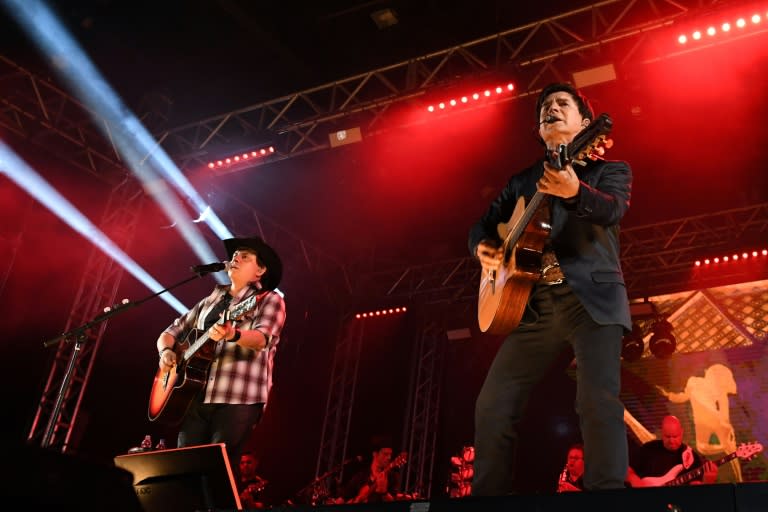Brazil's new-wave country music conquers land of samba
Brazil may be the land of samba and bossa nova, but lately its hips are swaying to a different rhythm. In cowboy hats and plaid shirts, with touches of bling, new-wave country singers are conquering the airwaves and the dance floors. A world away from the soft jazz and Latin rhythms that Brazil crafted from the 1960s, this is "sertanejo" -- the catchy sound of the deep country. Couples dance cheek to cheek as "Jorge and Mateus" croon their songs of love and loss. "Chitaozinho and Xororo" set toes tapping with a banjo and violin. The music pulls at the heartstrings, say fans -- such as Cristina de Souza, 38. In pink lipstick and a heart-shaped necklace, she waits in line for a Jorge and Mateus concert in the sertanejo capital Goiania -- Brazil's answer to Nashville. "Sertanejo music is about the heart," she tells AFP. "It is about romance and suffering, so people identify with it. It is a rhythm that captivates everyone." - Love songs - Of the 100 most-played songs on the radio in Brazil last year, 75 were sertanejo, according to a ranking by music industry group Crowley. "Nowadays it has a very strong influence on Brazilians' everyday lives, on how they entertain themselves and build their identities," said Edson Farias, a sociologist at Brasilia University. "It has a decisive influence on how they relate to each other emotionally. People cry about their love lives, or celebrate them, listening to sertanejo." - Town and country - The style has existed for at least a century in this vast, farming nation. But it turned into a popular phenomenon from the 1980s, migrating to the cities. It adopted electric guitars, keyboards and full rock 'n' roll-style drum kits. Chitaozinho and Xororo's bestselling 1990 album "Asphalt Cowboy" captured the essence of this sertanejo fusion. "We felt that the music couldn't just stay restricted to an acoustic country style," says Jose de Lima Sobrinho, one half of the duo. Audiences are still flocking to see them. "It's about what people like to hear. It is about the lives of all Brazilians," Sobrinho tells AFP, at a concert in Goiania. "People from the interior, who know the countryside, farming, fishing -- those people have the greatest love for this music because it is part of their background," he says. Now younger acts such as Jorge and Mateus are reinventing the style. "Sertanejo is modern music," says one half of the duo, Jorge Alves Barcelos. "You can use a wide range of musical instruments. You can incorporate Latin influences or more traditional influences, or something more electronic. Nowadays, sertanejo has it all." - Country bling - Some modern country stars like Jorge have also departed from the country dress code of plaid shirt and cowboy hat. He performs with gelled hair, a neatly trimmed beard and black t-shirt. "Their dress is no longer strictly hillbilly style," says Farias, who is studying the country music craze. "They wear jeans like North American cowboys, along with various symbols that show they have money." But even in its modern cosmopolitan form, sertanejo exalts basically conservative values, Farias says. It is perhaps more reminiscent of Tammy Wynette's "Stand By Your Man" than life in the fleshpots of Brazil's big cities. Its songs talk of "virility and fidelity," Farias says, "and how heterosexual families are the normal thing."




